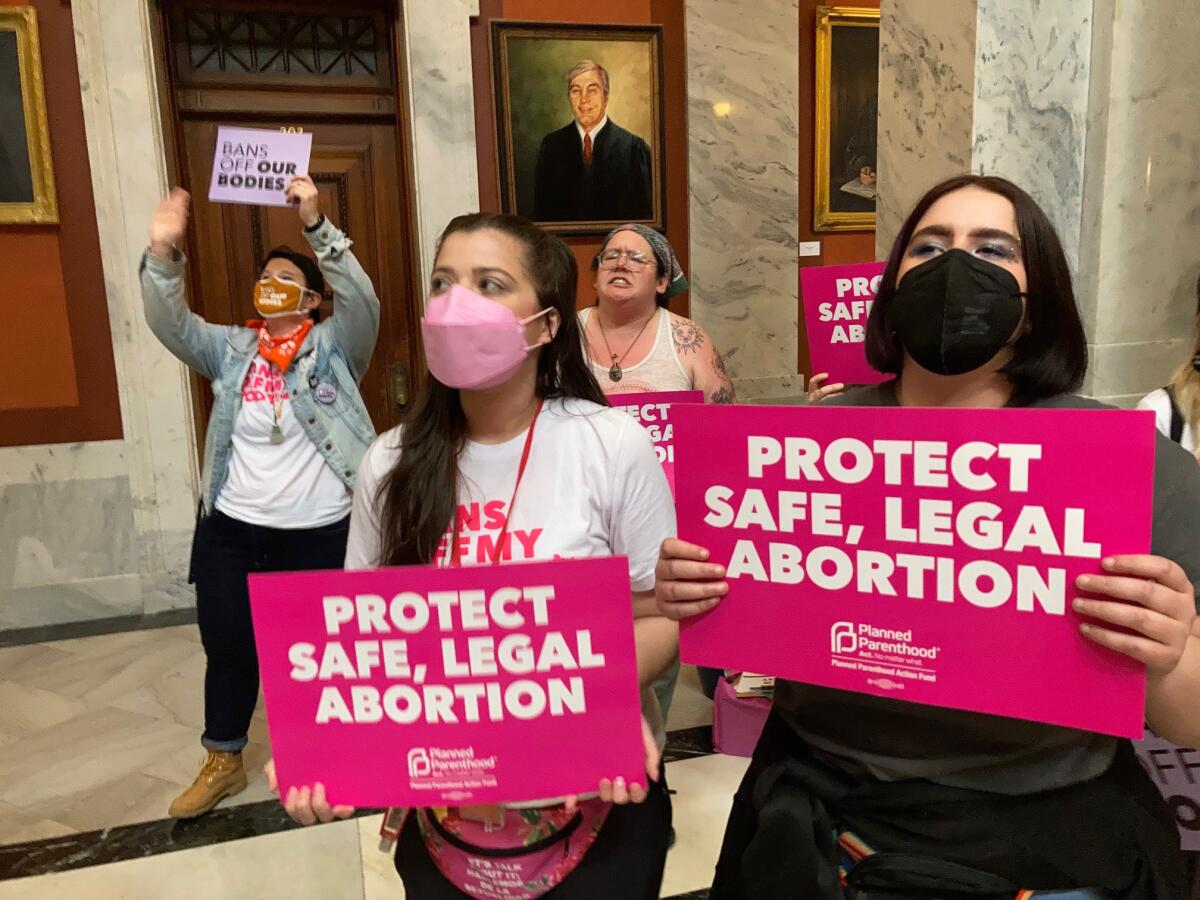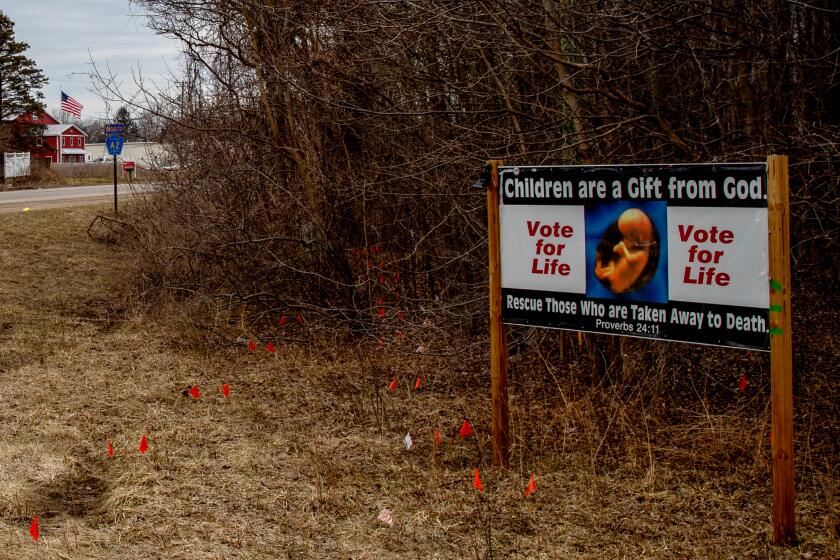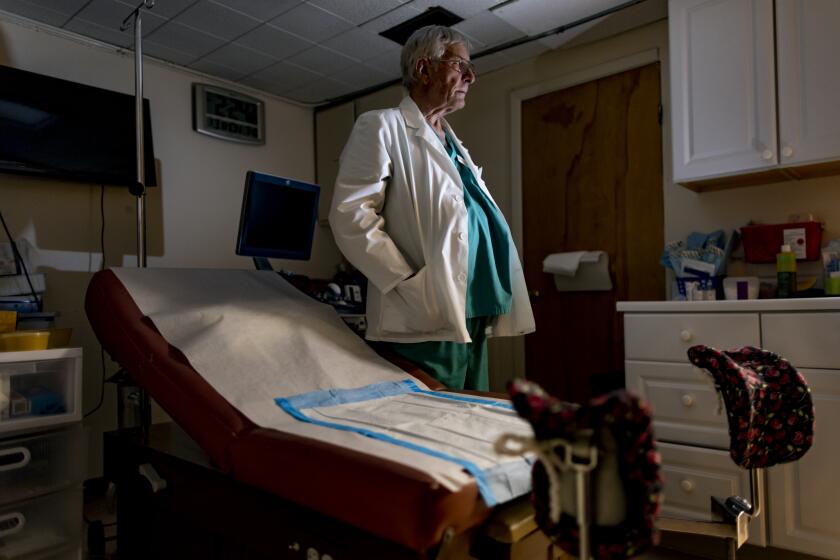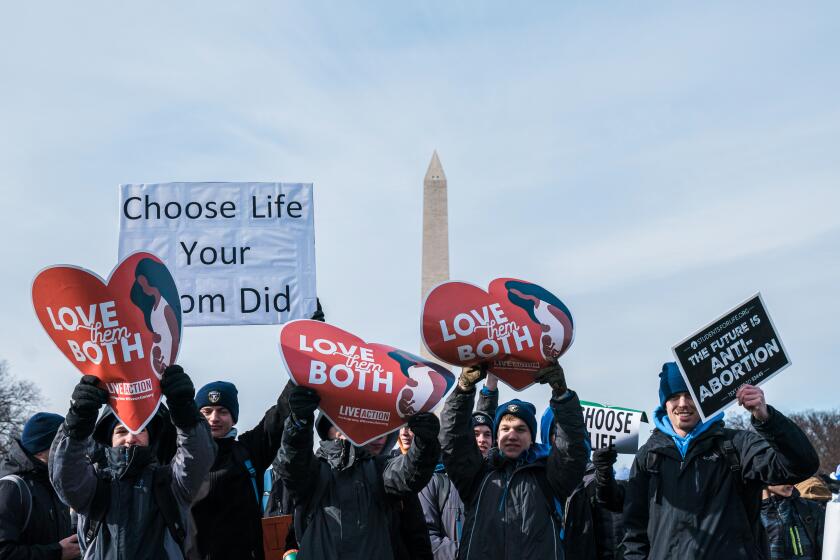Abortion-rights groups in Kentucky seek to block sweeping law

- Share via
LOUISVILLE, Ky. — Abortion-rights groups went to court Thursday seeking to restore abortion services in Kentucky, where the last two abortion clinics signaled they couldn’t immediately comply with sweeping new restrictions imposed by the Republican legislature.
Two lawsuits filed in federal court in Louisville asked that a judge intervene to block the law from taking effect while the case is litigated.
Kentucky’s GOP-dominated legislature overturned Democratic Gov. Andy Beshear’s veto of the abortion measure on Wednesday as the chants of abortion-rights advocates shouting “bans off our bodies” echoed through the statehouse. They joined Republican lawmakers across the country in passing new restrictions, while some Democratic-led states have worked to preserve or expand access.
In Kentucky, the new law is filled with revisions to the state’s abortion laws, with many new requirements that clinics must meet.
The two remaining abortion clinics in Kentucky — both in Louisville, the state’s largest city — can’t comply because the law mandates a new regulatory process that hasn’t been set up yet, resulting in an “unconstitutional ban on abortion in Kentucky,” the plaintiffs said.
“It is impossible to comply with its vast provisions, resulting in an immediate ban on abortion in the commonwealth absent this court’s intervention,” they said.
The Republican Party, evangelical Christianity and the antiabortion movement have long been inextricably linked. Some Christians want to change that.
Kentucky’s Republican attorney general, Daniel Cameron, said he is ready to defend the new law.
“The General Assembly passed HB 3 to protect life and promote the health and safety of women, and we are prepared to earnestly defend this new law against the legal challenge from Planned Parenthood and the ACLU,” he said in a statement Thursday.
About half of all abortions performed in Kentucky are the result of medication procedures. The new law, which took effect immediately, requires such women to be examined in person by a doctor before receiving the abortion pills through a registration process that hasn’t been established, they said.
EMW Women’s Surgical Center was closed Thursday and cannot provide abortion services until a court grants a temporary restraining order, while Louisville’s Planned Parenthood location remained open for other services such as STD testing, ultrasounds and birth control, their spokespersons said.
With the Supreme Court expected to rule on Roe vs. Wade in the coming months, a Colorado abortion provider has recommitted himself to what he says is his life’s work: helping women.
No protesters appeared at midday outside the Planned Parenthood office, and only two stood silently holding signs outside the surgical center, which has been targeted so frequently by protests that the city passed a law in 2021 creating a 10-foot-wide buffer zone.
The new Kentucky law also requires new reporting that will violate patient privacy, providing women with no protection against having their identities exposed through the information submitted by the clinics, the abortion-rights groups said.
Opponents also condemned the new law for failing to make exceptions for pregnancies caused by rape or incest. “Those are violent crimes,” Democratic Rep. Rachel Roberts said. “This bill forces those women to be violated again.”
Conservative statehouses are dropping rape exceptions from abortion bans as they look ahead to the Supreme Court’s expected decision in a major abortion case.
With this law, Kentucky now aims to ban abortions after 15 weeks of pregnancy, replacing the 20-week limit in the state code.
The 15-week ban is modeled after a Mississippi law the U.S. Supreme Court is considering in a case that could dramatically limit abortion rights in many states. The law’s supporters wanted Kentucky’s stricter ban in place in case the Mississippi law is upheld. In Florida, Gov. Ron DeSantis signed a 15-week abortion ban into law on Thursday.
More to Read
Sign up for Essential California
The most important California stories and recommendations in your inbox every morning.
You may occasionally receive promotional content from the Los Angeles Times.













